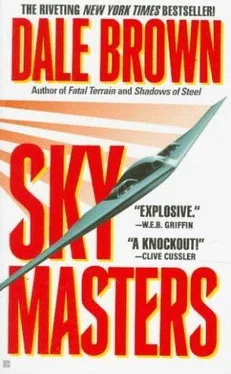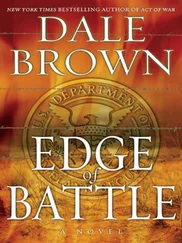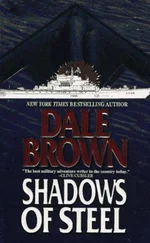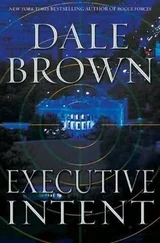Dale Brown - Sky Masters
Здесь есть возможность читать онлайн «Dale Brown - Sky Masters» весь текст электронной книги совершенно бесплатно (целиком полную версию без сокращений). В некоторых случаях можно слушать аудио, скачать через торрент в формате fb2 и присутствует краткое содержание. Жанр: Старинная литература, на английском языке. Описание произведения, (предисловие) а так же отзывы посетителей доступны на портале библиотеки ЛибКат.
- Название:Sky Masters
- Автор:
- Жанр:
- Год:неизвестен
- ISBN:нет данных
- Рейтинг книги:4 / 5. Голосов: 1
-
Избранное:Добавить в избранное
- Отзывы:
-
Ваша оценка:
- 80
- 1
- 2
- 3
- 4
- 5
Sky Masters: краткое содержание, описание и аннотация
Предлагаем к чтению аннотацию, описание, краткое содержание или предисловие (зависит от того, что написал сам автор книги «Sky Masters»). Если вы не нашли необходимую информацию о книге — напишите в комментариях, мы постараемся отыскать её.
Sky Masters — читать онлайн бесплатно полную книгу (весь текст) целиком
Ниже представлен текст книги, разбитый по страницам. Система сохранения места последней прочитанной страницы, позволяет с удобством читать онлайн бесплатно книгу «Sky Masters», без необходимости каждый раз заново искать на чём Вы остановились. Поставьте закладку, и сможете в любой момент перейти на страницу, на которой закончили чтение.
Интервал:
Закладка:
“Nothing, Comrade Premier, ” Leing replied. “I thank you for your generous offer. I too wish to extend the greetings of the Republic of Vietnam.” Cheung bowed slightly at the neck, and the civilian members of the Cabinet did likewise-the military members did not move. Chin appeared as immobile as stone, unblinking and inscrutable. “The Premier wishes to extend an invitation to the ambassador from Vietnam to attend a briefing on the situation in the Philippines and the South China Sea, ” the interpreter said. “High General Chin will conduct the briefing. We will outline the actions and events that precipitated the current military actions in that nation and explain our objectives and intentions.” Leing could have fallen over backward in surprise. The Chi nese Chief of Staff himself, conducting a briefing on his military actions-for a member of the Vietnamese government? The offer was astounding. China and Vietnam had a long, off-again and on-again relationship over the past fifty years. Both were Communist republics; Vietnam’s government was fashioned as a smaller copy of China’s. Both were military powers in the Pacific, with Vietnam having the world’s fourth-largest army and the world’s eighth-largest small-boat navy. But political relations were based on expediency and short-term interests, and those relations were usually stormy at best and warlike at worst. Currently, relations were at the simmering but nonbelligerent level. The Spratly Islands question, long a point of contention, was at an impasse, with China having the definite edge. Vietnam had countered with its full membership in ASEAN, and with improving its relations with the Soviet Union, the United States, and many other countries. The brief but violent war over the Spratly Islands in the late 1980s was all but forgotten, border skirmishes were rare, and things were tense but bloodless for a few years now. Why would China feel the need to advise Vietnam on its current conflict in the Philippines? “On behalf of my government, I accept your gracious offer, Comrade Premier, ” Leing replied warily. “The incidents of the past few days in the Philippines have caused much concern in my country. “Allow me to assure you, Comrade Ambassador, ” the interpreter said, “that the People’s Republic of China harbors no ill feeling toward Vietnam. Our forces will not threaten any Vietnamese facilities or vessels in the region. You have the word of the Premier.”
“I thank you for your assurances, Comrade Premier, ” Leing said. Leing risked a full glance at General Chin, to perhaps see if Chin, the real power where Chinese foreign intrigue was concerned, would give similar assurances; he did not. His return stare was powerful enough to make Leing silent: “Your assurances are important, since Chinese naval vessels patrol the entire Spratly archipelago, within striking distance of Vietnamese-settled islands. My government will be relieved to hear that these warships mean no harm.” It was General Chin’s turn to speak now, and he did so without waiting for permission. “I give you my assurance that no Chinese vessel will approach any Vietnamese-claimed islands or interfere with Vietnamese naval operations in any way, he said through the interpreter. Leing’s own interpreter gave a slightly different version of Chin’s statement-he said that no Chinese vessel will land on a Vietnamese-claimed island or interfere with legitimate Vietnamese naval operations in any way. Leing nodded. The exact wording was not important: these men were not to be trusted no matter what they said. Actions spoke louder than words, and so far their actions suggested the Chinese Navy was in the Spratly Islands to stay. “So I am to assume, Comrade General, that Chinese warships will continue to patrol north of the neutral zone, in violation of international treaty?”
“We were invited by the government of the Philippines to assist in national self-defense matters, ” Chin said. “The request included patrolling their islands for signs of rebel activity. We are protecting their interests as well as yours, since as we have seen the rebel military’s actions are a threat to all nations.” Lies, Leing thought, struggling to keep his face as impassive as possible. The whole world knows it was a Chinese nuclear warhead that exploded in the Palawan Straits. Do they really expect me to believe this fairy tale? “My government appreciates the truth in your words, Comrade General, ” Leing said evenly, “but also prefers that international treaties be strictly followed.”
“The terms of the treaty between us have been altered by recent events, ” the Chinese Foreign Minister, Zhou Ti Yanbing, said. “Because of the nuclear explosion, we felt our forces were at substantial risk in the South China Sea and that an escalation of our naval presence was necessary. At the same time, we were invited by the government of the Philippines to assist them in putting down a suspected coup and a violent military attack by well-armed forces. Those are the facts, and we speak the truth.” Not the whole truth, Leing noted: it was the Chinese who set off the nuclear explosion, the Chinese who posed the greatest risk to neighboring nations. The Philippine coup was just a fortuitous opportunity for the Chinese to complete their long sought-after conquest. . “However, the situation has become even more unstable for us and for all nations involved in this incident, ” Zhou continued. “We realize that new priorities must be established and new ties formed between the affected nations-especially between China and Vietnam.” “What sort of ties are you referring to, Comrade Foreign Minister?” There was a pause, an uneasy silence notably between General Chin and Premier Cheung-although no words or glances were exchanged, the two men were on edge. Then Cheung spoke, and the interpreter said, “We wish to issue a ninetynine-year irrevocable lease to the Republic of Vietnam to occupy, develop, patrol, and regulate affairs in the entire Nansha Island archipelago.” Leing was stunned. “I… Please, Comrade Premier, if you would be so good to repeat your last statement. General Chin made a sudden outburst, and Cheung replied hotly without turning toward him. “The General said, ‘This is nonsense, ‘ and the Premier ordered him to keep quiet, ” Leing’s interpreter whispered into the ambassador’s ear. “I believe you heard correctly, Comrade Ambassador, ” Foreign Minister Zhou said through his interpreter. “We wish to turn over control of the Nansha Islands to Vietnam. We will surrender all interests we currently hold in the islands to you for a period of ninety-nine years, after which time we will agree to enter into negotiations for outright transfer of ownership or an extension of the lease to you.” Then Leing’s interpreter added, “It appears to me that General Chin is opposed to the plan.” Leing was shocked. China, which patrolled the Nansha Islands-the Chinese term for the Spratly Islands-as if they were a mainland province-had even defended their rights to the islands with atomic weapons. Now they were willing to just give the islands up? And give them up to Vietnam, which was once an ally but was now a clear adversary? As early as 1988, China had come a hairsbreadth away from invading Vietnam over the Spratly Islands. . . “This is most unexpected, Comrade Premier, ” Leing said, finally regaining control over his numbed senses. “It is a most attractive offer. Naturally, I assume there is a condition to this transfer?” Of course there was-and Leing finally realized what it might be…. “You are correct, Comrade Ambassador, ” the interpreter said for Foreign Minister Zhou. “Although we freely admit that an adjustment to the turbulent situation in the Nansha Island chain meant that this action was far overdue: “We realize that a vote will be forthcoming when the Association of South East Asian Nations meet in Singapore and the question of our occupation of the Philippines is brought forward. We have tried to assure all countries involved in this situation that our involvement was requested by the Philippine government and that we are acting in strict accordance with international law; however, we realize that outside, nonCommunist sympathizers will attempt to undermine our efforts to restore peace to the region. China has not been offered an opportunity to voice our side of the matter, which precludes any sort of fair and equitable resolution of this incident. “We are therefore asking that when the vote is called, the Vietnamese vote against any ASEAN resolutions to interfere in the Philippines, and that you urge other nations in ASEAN to vote against any resolution as well. Since a unanimous vote is necessary for ASEAN to take military action or impose severe economic embargos, your action would postpone any serious consequences. “In addition, if you agree to assist us militarily in defending our right to remain in the Philippines, the Republic of China will propose a similar lease agreement to the Republic of Vietnam for the western group of the islands known as the Crescent Group in the Xinsha Islands archipelago.” The offer was astounding. China was in effect offering the Vietnamese a controlling position to the entire South China Sea in exchange for cooperation in its operation in the Philippines. In terms of value and strategic importance, it was not an equitable trade-the Philippines was by far a much brighter gem than the Spratlys or the Paracels-but by establishing offshore bases, Vietnam would once again be able to build a blue-water navy and exert its will in Southeast Asia. It could finally be able to counter the growing democraticoligarchic influence of the Moslem nations of Indonesia, Malaysia, Singapore, and Brunei by being able to effectively operate naval and merchant fleets far from home ports. “I do not see how such an action can be construed as anything else than conspiracy and duplicity, ” Ambassador Leing said. Premier Cheung’s face was impassive, but Leing measured the government’s reaction in General Chin’s face-it was obvious the warlord didn’t enjoy taking any lip from a Vietnamese politician. “But the return of our territorial islands of Dao Quan Mueng Bang and Dao Phran-Binh would be of immense pleasure and gratification to my government. The ploy worked. Instead of calling the contested islands by their Chinese names, Leing used the ancestral Vietnamese names-Dao Quan Mueng Bang for the Spratlys, Dao PhranBinh for the Paracels-and those names infuriated General Chin, who launched into a furious tirade, first at Leing and then at Premier Cheung. “He says that this is a crazy idea, that it will never be, that Vietnam cannot be allowed to take.. .” his interpreter quickly responded. “He is now telling me to be silent or he will cut off my… my penis, and stuff it in my… General Chin is very angry, Comrade Ambassador. Perhaps we should leave. “No, ” Leing said in Vietnamese in a low voice. “There is obviously a power struggle going on here. We must be witness to it before we can take this proposal to Hanoi.”
Читать дальшеИнтервал:
Закладка:
Похожие книги на «Sky Masters»
Представляем Вашему вниманию похожие книги на «Sky Masters» списком для выбора. Мы отобрали схожую по названию и смыслу литературу в надежде предоставить читателям больше вариантов отыскать новые, интересные, ещё непрочитанные произведения.
Обсуждение, отзывы о книге «Sky Masters» и просто собственные мнения читателей. Оставьте ваши комментарии, напишите, что Вы думаете о произведении, его смысле или главных героях. Укажите что конкретно понравилось, а что нет, и почему Вы так считаете.












